Across the region, theater companies are making masks, distillers are bottling hand sanitizer, restaurants are making exquisite meals and, of course, a San Juan Island tour company is streaming whales to soothe everyone in quarantine
by Cathy Carroll
ALTHOUGH COMPANIES THROUGHOUT the Pacific Northwest are feeling the economic pain of the pandemic, they haven’t let that get in their way of duty. Just as businesses had heeded President Franklin Roosevelt’s World War II mandate that “powerful enemies must be out-fought and out-produced,” companies are all in for the fight against the coronavirus.
The “Rosie the Riveters” of our day, this group is retooling to manufacture weaponry to crush COVID-19. Theater costume makers are sewing masks. Distillers are mixing hand sanitizer. Global sportswear and aeronautics brands are making face shields, chefs are delivering food to healthcare workers and leading research institutions are searching for the medicine that will stop this scourge.
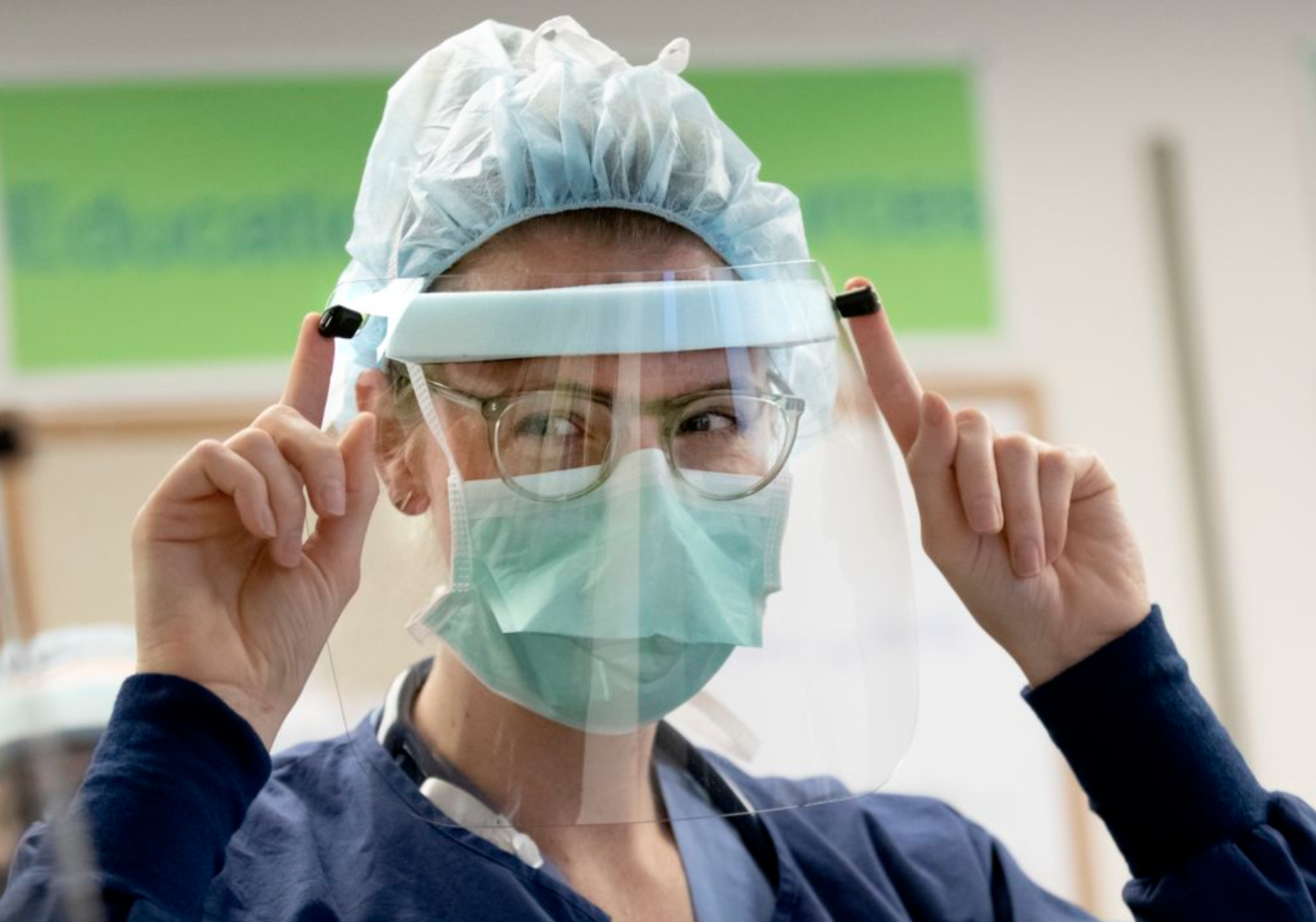
Just Shield It
Sportswear giant Nike is working with Oregon Health & Science University to develop protective equipment such as face shields and other protective equipment for doctors and nurses on the front lines of the crisis, beginning with those in their home state. The global retailer has joined other sports industry businesses around the country in the mantra: “We’re all on the same team.”
Nike’s Air Manufacturing Innovation teams in Oregon and Missouri repurposed shoe padding, apparel cords and thermoplastic polyurethane, the brand’s signature foam cushioning soles in their effort.
“The full-face shields help protect healthcare workers’ faces and also help to prolong the length we can safely use a surgical or N95 mask,” said Miko Enomoto, M.D., associate professor of anesthesiology and perioperative medicine, OHSU School of Medicine.
TPU foam is also being used to create new lenses for air purifying respirator helmets used in the most critical procedures and care of infected patients. Nike’s facility in St. Charles, Missouri, has decades of experience in designing, developing and manufacturing many TPU-based products. To combat Covid, it is rapidly adapting capacities and new production line procedures to keep pace with rapidly changing government guidelines, according to Nike.
“I’ve been so inspired by how our community has united to meet this health crisis,” said Danny Jacobs, M.D., M.P.H., FACS, president, Oregon Health & Science University. “We are forever grateful to the commitment of our colleagues at Nike, as their dedication to our united effort will help save lives.”
The new helmet lenses and full-face shields are going to Providence, Legacy Health Systems, Kaiser Permanente and others across Oregon.
***
As soon as the entertainment business went dark in Portland in early March, professional costume creators and other backstage works took a leading role in sewing face masks for the harrowing drama playing out in real life. About fifty artisans, craftspersons and other workers got to the task, said Rose Etta Venetucci, business representative for Local 28 of the International Alliance of Theatrical Stage Employees (IATSE), the union representing about 700 workers in theatre, film, television production and trade shows. All but about three of them lost their jobs.
“Our masks have really gone far and wide,” she said, “to hospitals, Portland public school painters who still had to go to work, school bus drivers delivering lunches for kids in need, grocery stores, a mortuary, food pantry volunteers. Every time we send out more masks, we seem to get more volunteers.”
People donated fabric, and Portland Opera loaned them sewing machines. Other unions joined in. Retired teachers helped sew. Teamsters deliver the masks, laundered after being sewn, each packaged in a quart-sized plastic bag.
Dubbed “Masking 2020,” IATSE Local 28 got support from unions representing studio mechanics, filmmakers and actors and Oregon Ballet Theater, suffering from having to shut down its lifeline — classes. Local 28 is also making clear vinyl masks, allowing hearing impaired people to read their lips. Labor’s Community Service Agency, which offers health and social services to working and needy families, saw their volunteers who sew Christmas stockings for kids in winter take up mask-sewing.
“There has been a lot of piecing it together,” said Venetucci. “It’s like a little army of people — It’s kind of fun to see everyone jump in, and none of the masks are going to waste.”
Local 28’s efforts began early in part because Venetucci and several colleagues got sick with fevers and coughs in mid-March. They self-isolated at home and are recovering well. Without testing, most don’t know if COVID was the cause.
“All of us who got sick when I did are fine, we haven’t lost anyone, although we have in New York and other locals,” said Venetucci. “We’ve been through a lot in this really horrible crisis, but it also has been really uplifting to see so many who want to help.”
The mask-making effort seemed to spread as quickly as the virus. IATSE union workers in Seattle launched Crafters Against COVID-19, similar to the one in Portland and has made nearly 10,000 masks. Seattle Opera volunteers have made about 5,000. IATSE Local 488’s studio mechanics have sewn and distributed about 2,000 more.
Today, the Women’s Committees of IATSE across the U.S., Canada and Puerto Rico, are making masks, face shields and gowns, Venetucci said.
***
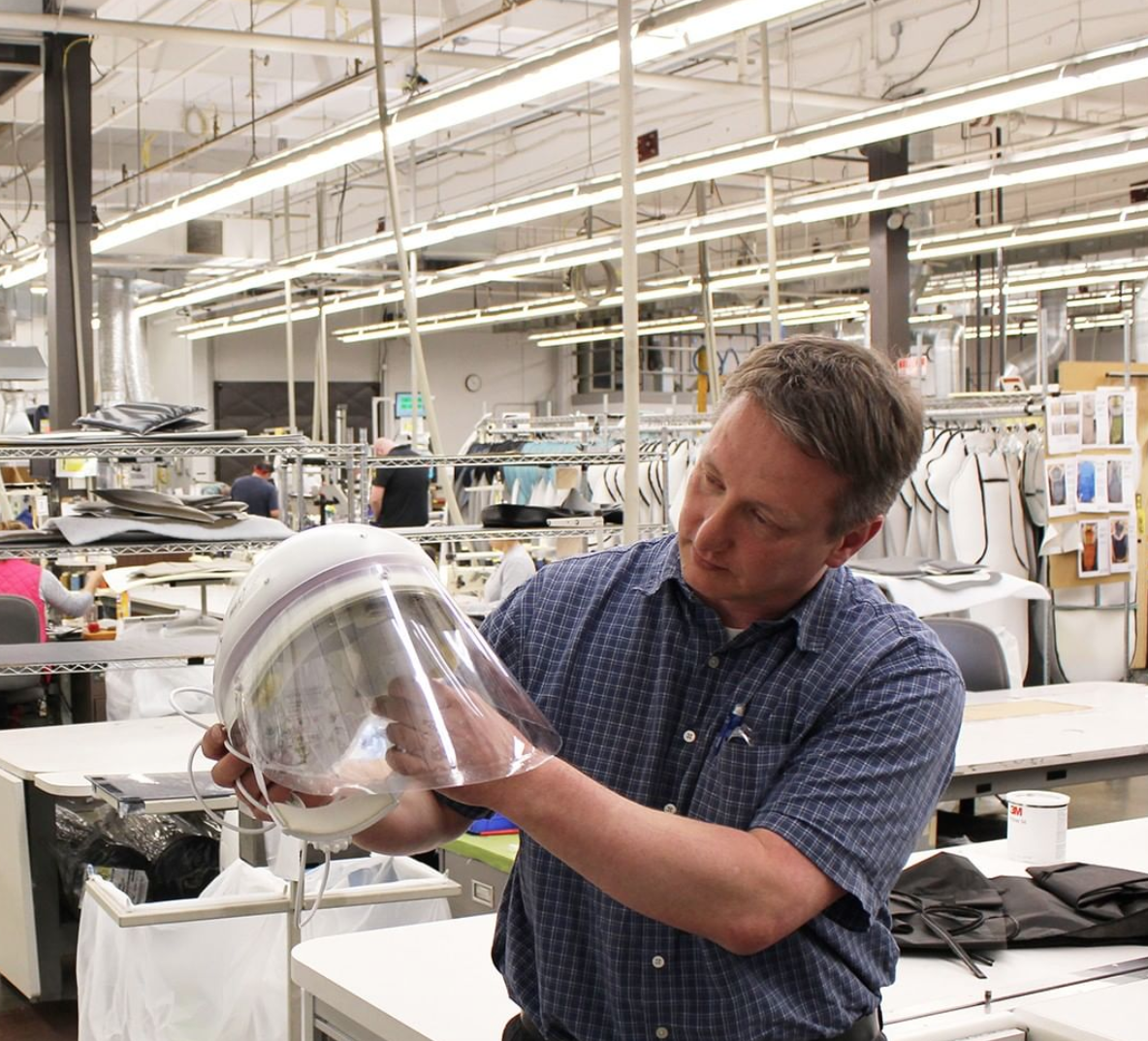
In Newberg, family-owned dental care equipment company A-dec has converted several of its manufacturing areas to make face shields and other protective that health and emergency responders in their area critically need.
After a local worker from Legacy Health asked for assistance, A-dec employees worked around the clock over a weekend to develop prototypes of needed supplies. In little more than a week, A-dec mobilized its production shift, but now face a shortage of materials.
The Boeing Company of Seattle will be producing face shields using its 3-D printing machines and is also offering their Dreamlifter cargo plane to transport critical and urgently needed supplies.
Toast, a small, Portland-based company that creates wood and leather goods for tech devices has switched gears and is now producing reusable face shields.
PNW-Open Source COVID19 Medical Supplies is a 1,500-member Portland 3-D Printing Lab meetup that has organized volunteers around the region to use personal 3-D printing equipment to make face shields. A GoFundMe campaign is helping the group collect community donations to replenish materials to print more face shields.
Langolitz Leathers in Portland, known for its high-end leather jackets and biker gear, has switched production to leather facemasks. These are secondary masks intended to redirect the highly needed medical-grade masks to the areas of healthcare that need them most.
Protective Garments
Portland’s Looptworks, which makes upcycled garments, is pivoting to produce washable garments that meet government requirements for workers at hospitals and medical delivery services. They are also going to grocery stores, airlines and other essential workers.
Portland Garment Factory is making gowns and 7,000 barrier masks at cost for medical professionals, including for midwives and doulas.
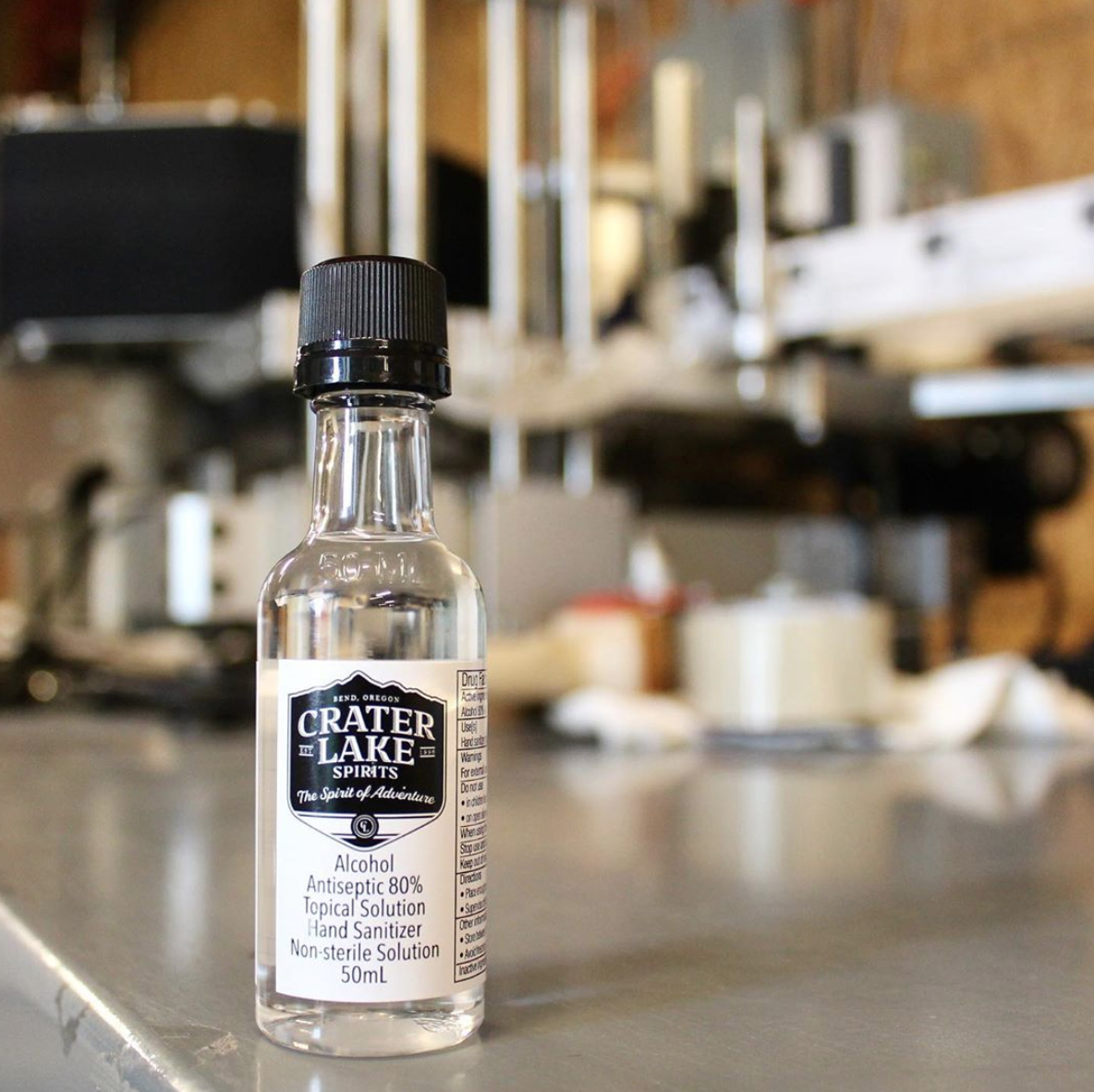
The Other Alcohol in Demand
As distilleries across Oregon and Washington have laid off workers, shutting down tasting rooms for everything but retail sales of bottles spirits, they’ve pivoted to making hand sanitizer, a prized commodity in this time of viral contagion. Although Oregon liquor sales have recorded record sales since the pandemic struck, distilleries have had to cancel events and have lost significant business, said Alan Dietrich, CEO of Crater Lake Spirits in Bend.
That gave his production team the bandwidth to switch from inebriating booze to COVID-busting hand sanitizer. Although both may ease the tensions of life’s difficulties, and they share a singular ingredient, ethanol, the other ingredients and production processes differ dramatically, he said.
Distilleries have had to source new, key ingredients, such as aloe, glycerin and hydrogen peroxide, plus new packaging. “The biggest roadblock has been finding those raw ingredients,” Dietrich said.
Then the Oregon Liquor Control Commission, Oregon Health Authority, other state agencies and Moda Health, coordinated the effort, pooling and identifying resources and directing the finished product to those who needed it most. “For those of us who complain about government, this is one thing you’ve done well, guys,” Dietrich said.
His distillery solved the packaging problem—filling the palm-sized 50-milliliter in-flight bottles they’d used to supply Alaska Airlines. This size was too small to give to hospitals, so they gave it away to consumers and liquor stores.
Oregon Spirit Distillers is selling hand sanitizer at the distillery in Bend. Shine Distillery & Grill in Portland began making and selling sanitizer in early March and is selling it along with bottles of spirits while their restaurant is closed.
Rogue Spirits in Newport has been making the product, too, donating its Helping Hand Hand Sanitizer to first responders along the coast. “It came about as an employee passion project, and their dream became a reality thanks to a collaborative team effort,” said Jack Waibel, the distillery’s vice president of production.
Hood River Distillers delivered 1,000 gallons of the hani-sani so far, with 4,000 gallons more in production.
In Spokane, Dry Fly Distilling created the Spokanitizer, distributing it for free to first responders, healthcare workers, social services such as Meals on Wheels, nursing homes and to the public until running out. They’re making more, though.
Orcas Island Distillery, switched to making sanitizer, which it’s donating to emergency workers and others in need. Owner Charles West said he feels closer to the dangers at hand, through his son, who is working as an Army National Guard incident manager and flight medic, while his daughter-in-law serves as an emergency room doctor. In the meantime, West and his wife are caring for their grandchildren.
OrcaSong Farm in Eastsound, Washington’s San Juan Islands, is offering the product, enhanced with the soothing qualities of their farm-grown lavender, Vitamin E, and aloe vera along with isopropyl alcohol and hydrogen peroxide.
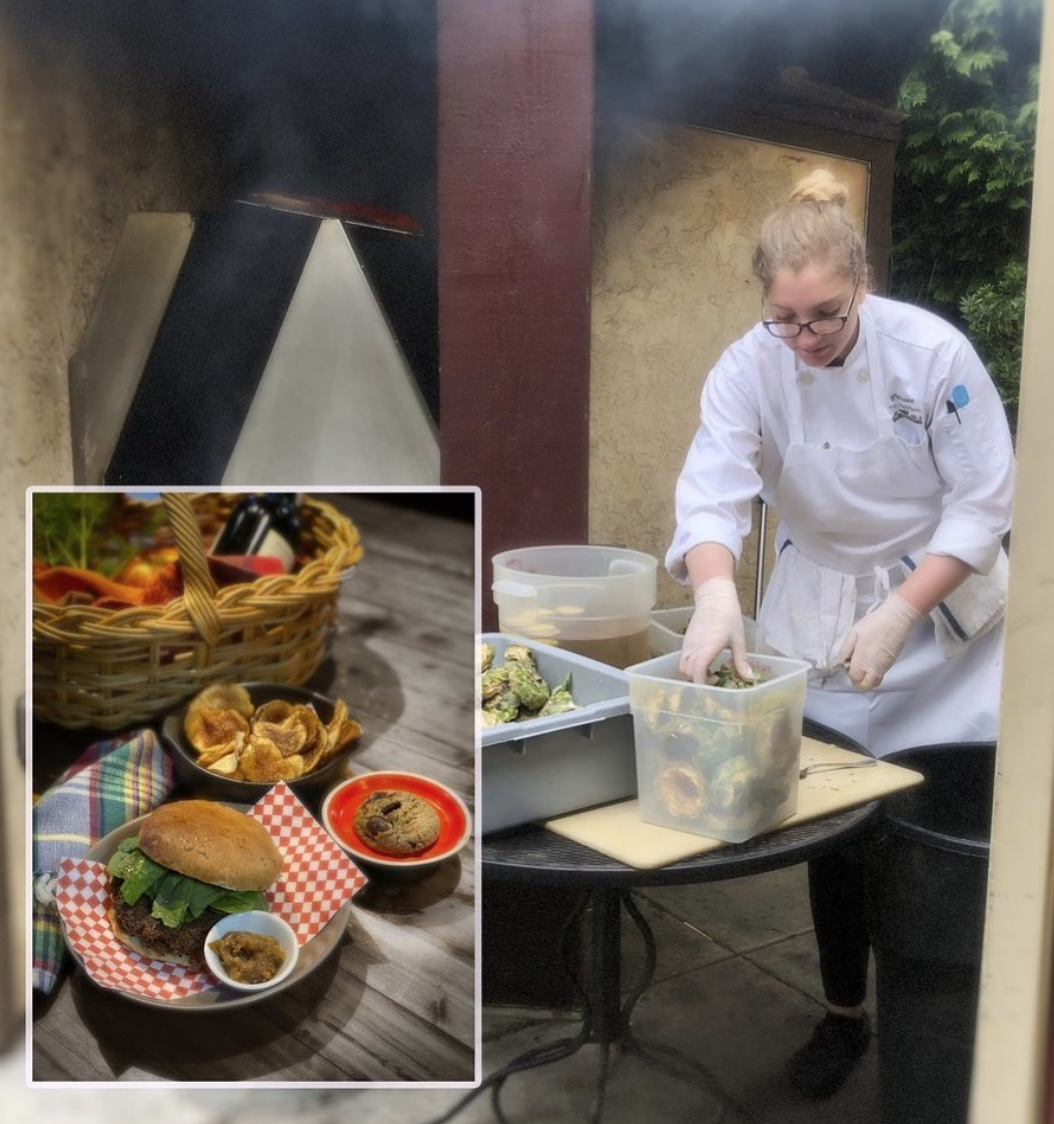
Restaurants Feed the Cause
The Portland branch of national nonprofit Frontline Foods is collecting donations for restaurant partners to deliver meals to frontline health workers. The program not only gets food to medical personnel, it supplies local restaurants with a much-needed income stream. Popular restaurants such as Top Burmese, Kachka, Sisters Deli and Pine State Biscuits have supplied meals for staff at OHSU and Providence’s COVID-19 testing sites.
Cheryl’s on 12th in Portland is matching 50 percent of donations collected through a GoFundMe campaign to deliver meals to the staff at hospitals and clinics all over Portland.
Portland’s Memoz Dessert Cafe is collecting donations for providing surprise dessert deliveries to Portland-area healthcare workers on the frontline of the COVID-19 crisis.
Coquine restaurant in Portland launched a curbside, community supported agriculture pick-up to help keep their suppliers in business. Order direct-from-the-farm vegetables such as potatoes, leeks, radishes, cauliflower, spinach, parsnips, beets, parsley; whole milk from grass-fed cows, line-caught black cod or housemade sauerkraut, a lamb leg roast and other offerings.
Burgerville, a fast-food restaurant with 42 locations in Oregon and Washington, is serving local healthcare workers with weekly Burger Breaks — delivering more than 100 cheeseburgers to hospitals and healthcare facilities in and around Portland.
Starbucks is giving free coffee to first responders and healthcare workers during the coronavirus outbreak.
Globally renowned restaurant The Herbfarm in Woodinville, is preparing meals to bring to hospital workers.
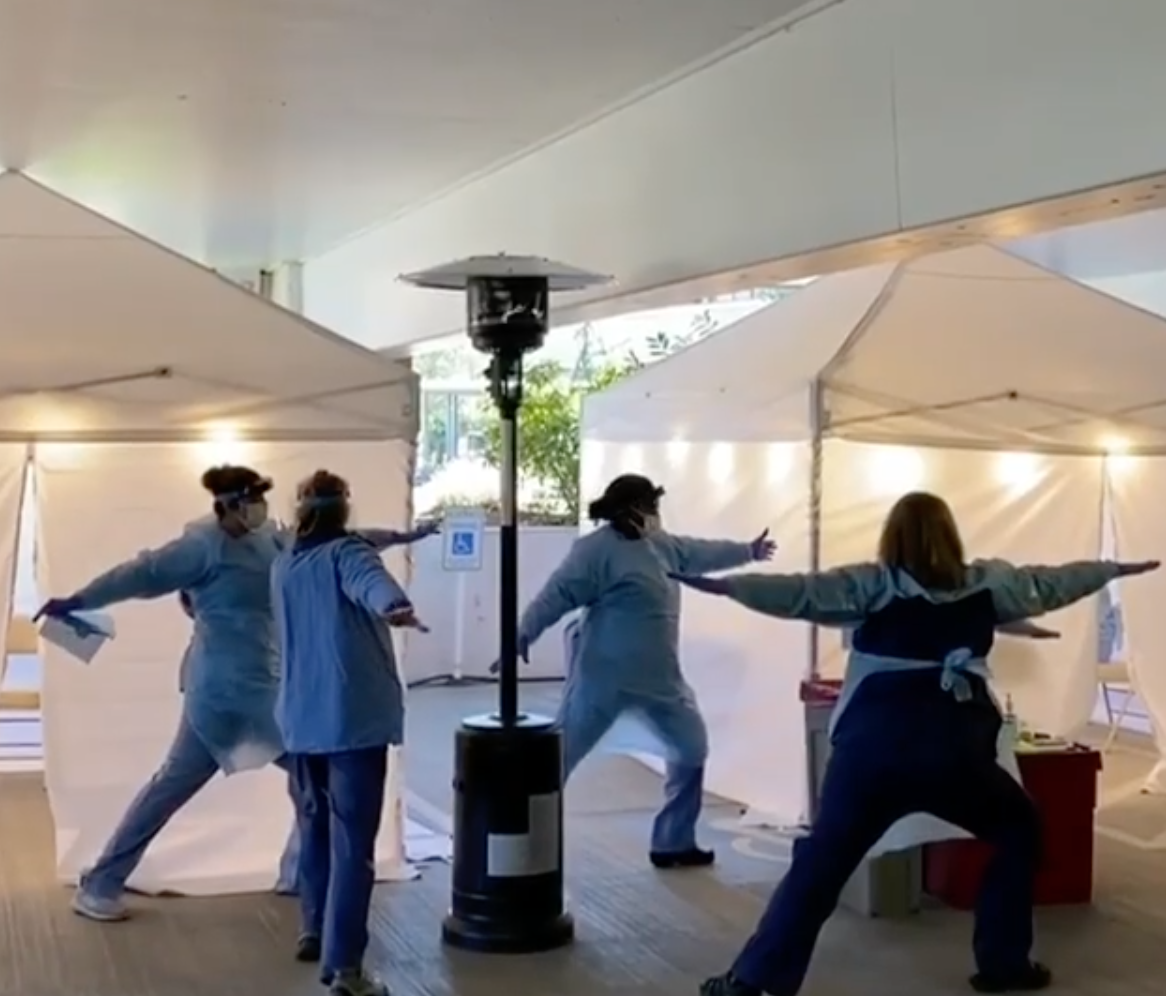
Research for the Cause
With no vaccines or treatments for COVID-19, top research teams at the University of Washington and New York University have partnered in a groundbreaking effort to change that. They are studying how hydroxychloroquine (HCQ) could work to prevent people getting COVID-19. University of Washington Medicine and Bloodworks Northwest are seeking adult volunteers who have recovered from documented SARS-CoV-2 (COVID-19) infection to donate blood samples for the study. It could be used to make medicine containing antibodies that may help people who are ill with a COVID infection.
At OHSU, cardiologists have raised concern that an anti-malaria treatment being used to treat patients with COVID-19 can increase the risk of dangerous abnormal heart rhythms. They published guidance for doctors about this on March 29. Meanwhile, OHSU researchers have issued methods for protecting health care workers and non-infected patients.
Fred Hutchinson Cancer Research Center in Seattle developed a resource hub that shares new research developments to understand this pandemic and inform efforts to stop it. The center is home to three Nobel laureates and interdisciplinary teams of world-renowned scientists that seek new and innovative ways to prevent, diagnose and treat cancer, HIV/AIDS and other life-threatening diseases.
Fielding for the Cause
CenturyLink Event Center in Seattle has been converted to an Army-run, 250-bed field hospital that’s meant to treat non-COVID-19 patients so area hospitals will have more beds to care for those infected by the coronavirus.
Lodging Leans in for the Cause
Caravan Tiny House Hotel is offering their funky, artistically designed homes on wheels at deeply discounted rates. They are shifting from nightly rentals, to serving those who need a short-term rental for one to four weeks. Priority goes to healthcare workers who need a place to self-isolate.
Tiny Digs Hotel, another tiny house hotel, is also offering reduced rates for medical personnel.
Geiser Grand Hotel is offering 600 room free nights to frontline workers in Baker, Union, Wallowa, Grant and Malheur counties.
In Seattle, Airbnb is partnering with their hosts to connect 100,000 healthcare providers, relief workers, and first responders with clean, convenient places to stay.
Bellevue behemoth Microsoft is leveraging its global supply chain to expedite shipping vital medical supplies from overseas to aid in the state’s coronavirus fight.
Amazon is prioritizing medical supplies and household goods for shipment
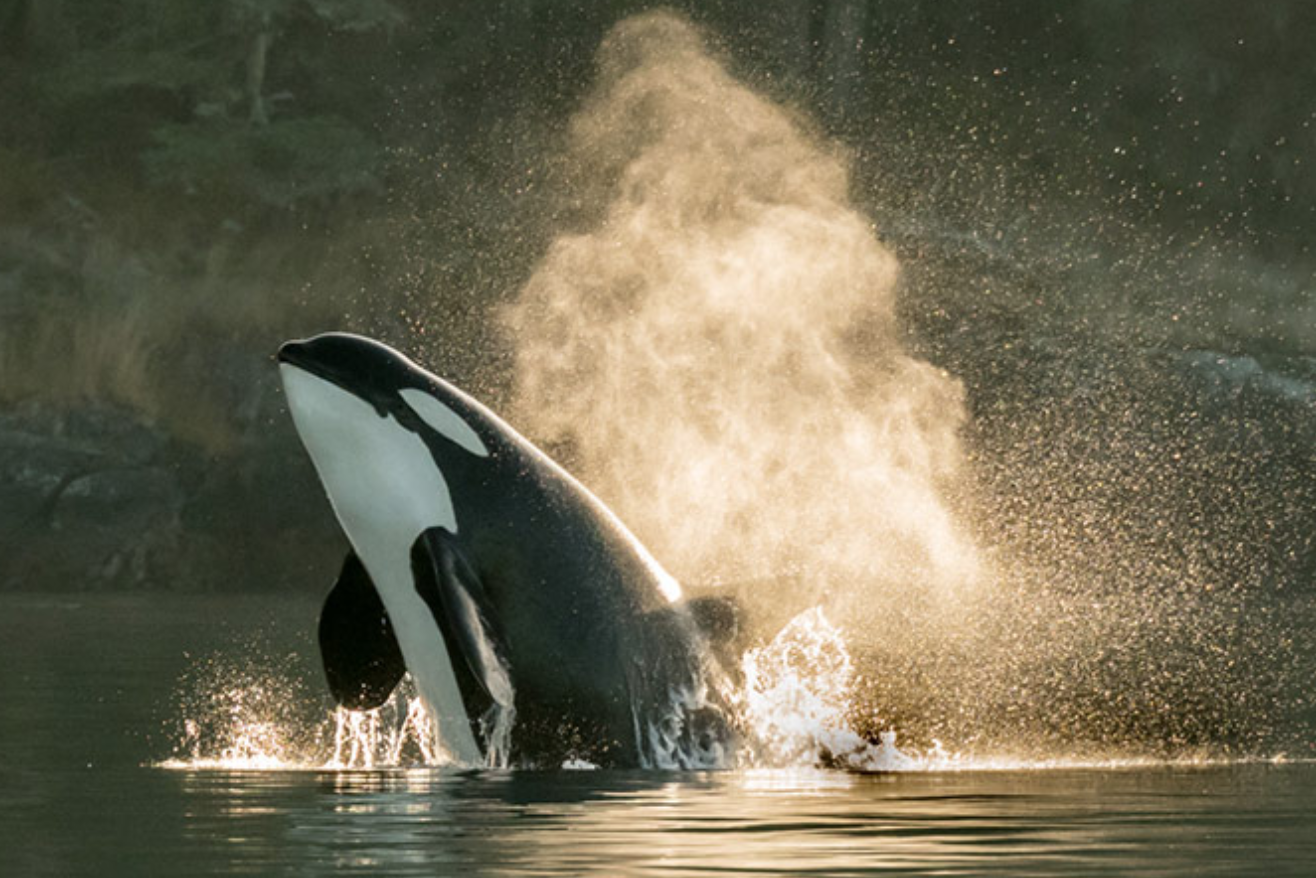
Comfort Amid COVID
Maya’s Legacy Whale and Wildlife Tours is livestreaming tours in the San Juan Islands via Instagram or Facebook instead of in person. The tour owners said they hope the virtual experience will ease the stress and anxiety of current daily life.
Portland-based Hanna Andersson, a privately held children’s apparel company with a heritage of Scandinavian design and sustainable creation, is supporting hospitals in cities across the country by donating organic cotton pajama sets to healthcare workers and patients in need. The company wants patients to feel as comfortable as possible while under care and express gratitude to offer healthcare workers.
We want to share the love as much as we can. Follow us on Instagram and tag #PNWCOVIDHeroes and we will share them back with our audience.




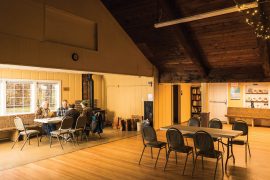
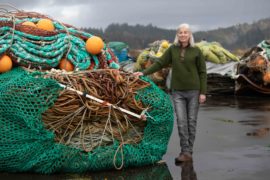
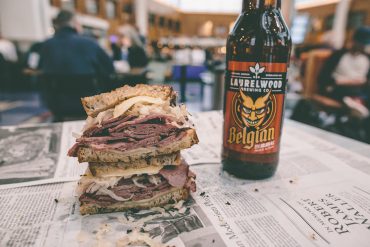



Good story about how compassionate Northwest businesses are helping the Northwest, thank you.